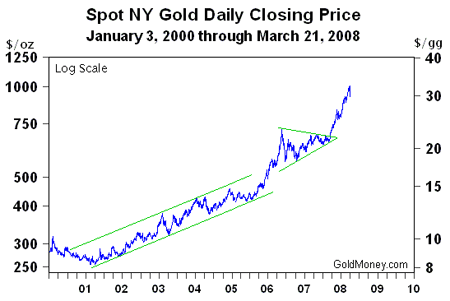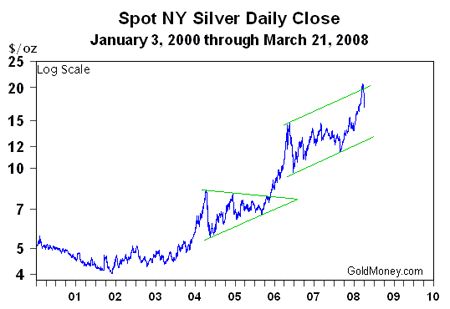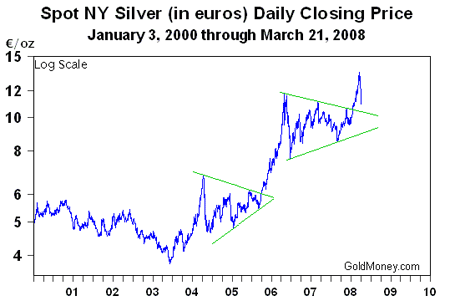Get the latest financial news, insights and expert analysis from our award-winning MoneyWeek team, to help you understand what really matters when it comes to your finances.
You are now subscribed
Your newsletter sign-up was successful
Want to add more newsletters?

Twice daily
MoneyWeek
Get the latest financial news, insights and expert analysis from our award-winning MoneyWeek team, to help you understand what really matters when it comes to your finances.

Four times a week
Look After My Bills
Sign up to our free money-saving newsletter, filled with the latest news and expert advice to help you find the best tips and deals for managing your bills. Start saving today!
A week ago one barrel of crude oil cost 3.422 goldgrams. Today a barrel of crude oil costs 3.445 goldgrams. So the price of crude oil in terms of gold hardly changed, but in terms of dollars, their prices fluctuated wildly. The dollar price of crude oil dropped 6.7% this past week, while gold dropped 7.3%.
There were similar results the previous week. The dollar price changes for crude oil and gold were increases of 3.4% and 2.7% respectively, while the gold price of crude oil increased a mere 0.7%.
Prices fluctuate because of the interaction between supply and demand, which is basic economics. But what is clear from a comparison of the above price changes is that this fundamental principle of supply and demand is distorted and therefore difficult to assess when the dollar - and for that matter, other national currencies - are used to measure prices.
MoneyWeek
Subscribe to MoneyWeek today and get your first six magazine issues absolutely FREE

Sign up to Money Morning
Don't miss the latest investment and personal finances news, market analysis, plus money-saving tips with our free twice-daily newsletter
Don't miss the latest investment and personal finances news, market analysis, plus money-saving tips with our free twice-daily newsletter
National currencies do not provide an accurate, consistent measure of buying power. In the words of Charles Holt Carroll penned in 1857:
'What we fancy to be a rise in value of our products is merely an alteration of the name in money that we exchange them by; they are not altered thereby, in their exchange value, with regard to each other.'
We've been here before
Here's another quote to demonstrate that this insight is not new. It is from An Enquiry into the Paper Credit of Great Britain, a wonderful book written in 1802 by Henry Thornton, an economist and governor of the Bank of England:
'We assume that the currency which is in all our hands is fixed, and that the price of bullion moves; whereas in truth, it is the currency of each nation that moves, and it is bullion which is the more fixed.'
We are today wrestling with the same monetary problems that Britain faced in the early 1800's. These are the predictable problems that arise from fiat currency, which is money backed by nothing but government promises. Fiat currencies today are losing purchasing power, repeating what happened to the pound in Thornton's day. Although the pound was nominally defined as a weight of gold, the redemption of pounds into gold had been suspended at the time Thornton wrote because the Bank of England did not possess enough gold to meet its monetary commitments.
Consequently, gold had disappeared from circulation within Britain because it was worth more than the depreciated British currency, proving accurate the dictum of another great British economist, Sir Thomas Gresham, that bad money drives out good. In their daily transactions people used pounds, instead of the good money - gold.
So what would you rather own? The volatile dollar, backed by nothing by hollow government promises, or gold and silver, which have proven themselves to be invaluable for centuries because they preserve purchasing power?
If you prefer to look at prices in terms of dollars rather than gold, all I can say about last week's volatility is that we've been here before. Many times in fact. Does the following sound familiar?
'The drubbing that gold received...no doubt has caused everyone a lot of soul searching. So what do we do? Simple, we stay the course. Continue to accumulate gold, as declines like the one seen on Friday enable you to get more metal for your dollars. And given the growing uncertainty about the dollar and its bleak prospects, gold is still the place to be.'
Those words are from my alert on October 5, 2003, a day that gold closed at $369.40 and EUR318.60. A few years from now I expect that we will look back at today's prices in the same way we now look back at those prices in 2003 - gold is cheap. Importantly, the trend for gold is still pointing up, as we can see from the following charts.

Silver: even more volatile
Silver also remains in an uptrend, though its decline this past week was more severe than that experienced by gold. Readers know that I am more even bullish about silver than I am about gold, but it is more volatile. As I am fond of saying, if owning gold is like flying in a 747, then owning silver is like flying in an F15. Be ready for the heart-stopping zigzags like the one we are now experiencing and that is clearly visible in the following charts.


I haven't seen anything to change my view that the dollar is on the same downward path. It's a path well-worn by many fiat currencies before it. It's the path to the fiat currency graveyard. Unless the US government changes its ways, the dollar will sooner or later get there. For this reason, it is better to own metal than paper.
James Turk is the Founder & Chairman of GoldMoney. He is the co-author of The Coming Collapse of the Dollar.
Get the latest financial news, insights and expert analysis from our award-winning MoneyWeek team, to help you understand what really matters when it comes to your finances.
MoneyWeek is written by a team of experienced and award-winning journalists, plus expert columnists. As well as daily digital news and features, MoneyWeek also publishes a weekly magazine, covering investing and personal finance. From share tips, pensions, gold to practical investment tips - we provide a round-up to help you make money and keep it.
-
 Should you buy an active ETF?
Should you buy an active ETF?ETFs are often mischaracterised as passive products, but they can be a convenient way to add active management to your portfolio
-
 Power up your pension before 5 April – easy ways to save before the tax year end
Power up your pension before 5 April – easy ways to save before the tax year endWith the end of the tax year looming, pension savers currently have a window to review and maximise what’s going into their retirement funds – we look at how

